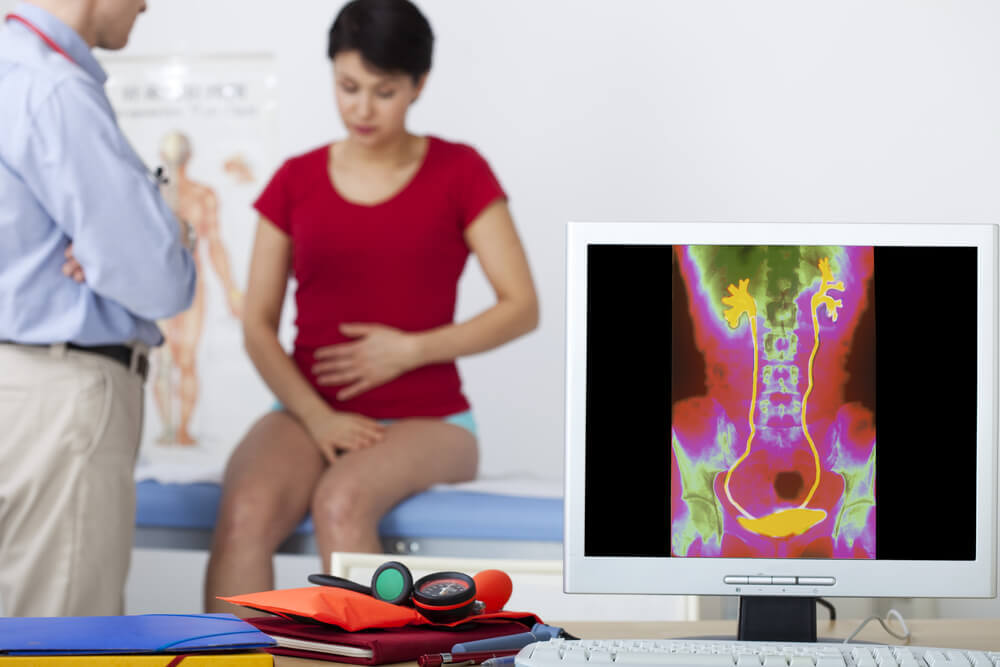The Symptoms and Treatment of Pyelonephritis

As a general rule, the term pyelonephritis is used to refer to a disorder affecting the upper urinary tract. Thus, infection occurs in this region and it normally reaches the pelvis and the renal parenchyma. Today, we’ll look at the symptoms and treatment of pyelonephritis.
In addition, it usually begins to develop in the urethra or bladder and later extends to the kidneys. At the same time, infections in the inferior urinary tract usually appear more frequently than this class of disorders.
In many medical problems, we can apply a classification criterion according to their duration. Pyelonephritis can come on suddenly and in a reduced period of time. However, the infection can last over time, making treatment and the patient’s quality of life more difficult.
In any case, it’ll be the doctor who must identify the most characteristic symptoms of this problem. In this way, by checking the circumstances of the patient and the disorder itself, the professional can choose the most appropriate treatment for each case.
What causes pyelonephritis?
As this is an infection, it originates in the proliferation of pathogenic microorganisms. In this case, most of the clinical cases have to do with an infection of bacterial origin.
On the other hand, the presence of microorganisms that are resistant to certain types of medicines or other less frequent species can also cause pyelonephritis.
You may be interested: Symptoms and Diagnosis of Chronic Kidney Failure
What are the most common symptoms of pyelonephritis?

Normally, when a patient develops some sort of change or medical problem they experience certain symptoms. The analysis of these signs will guide the team of experts to correctly identify the cause of the disorder. In any case, among the most frequent symptoms of pyelonephritis we can find the following:
- Fever that can vary in intensity
- Chills or tremors in different areas of the body
- Nausea and vomiting
- Lack of appetite– we’re referring to a decrease in appetite that can cause unintentional weight loss in a reduced period of time
- Headache or severe headache
- Strong discomfort in the lumbar area that can extend to other regions such as the abdomen and even the groin
- Itching and discomfort when urinating -in addition, patients expel a smaller amount of urine than usual; they may also feel that they haven’t completed urination or experience an urgent need to go to the bathroom.
- Alterations in the characteristics of the urine – for example, it contains blood or pus or is different in color or smell, etc.
Discover: 8 Recommendations to Prevent Urinary Infections
What is the appropriate treatment for pyelonephritis?

Today, specialists usually perform a series of medical tests in order to identify the trigger. Among them, they’ll review the symptoms that the patient has developed.
In any case, the professionals will plan the most appropriate treatment according to each patient and clinical case. Thus, among the guidelines or recommendations within the treatment of pyelonephritis, we can highlight the following:
- Antibiotics. These attack the bacteria that are causing these alterations. In the most complicated cases, the patient may need to undergo hospitalization to ensure recovery. This is necessary when the illness worsens or if oral antibiotics aren’t a viable option, etc…
- Rest or a temporary reduction in intense physical activity.
- Use of other types of drugs with the aim of solving the related symptoms. This is the case with intense fever and frequent nausea.
- Consuming a balanced and healthy diet containing the right amount of fluids.
It’s important to follow the recommended guidelines and treatments in order to accelerate recovery. This way, in addition, patients have a greater chance of avoiding possible complications. However, this isn’t always possible.
In any case, we hope to have resolved some doubts on the subject. But, if you experience any symptom or suspect you may be suffering from pyelonephritis, either acute and chronic, it’s essential that you go immediately to the doctor for a checkup.
All cited sources were thoroughly reviewed by our team to ensure their quality, reliability, currency, and validity. The bibliography of this article was considered reliable and of academic or scientific accuracy.
- Horcajada, J. P., & Smithson, A. (2003). Acute pyelonephritis in adults: An update. Reviews in Medical Microbiology. https://doi.org/10.1097/00013542-200310000-00003
- Ramakrishnan, K., & Scheid, D. C. (2005). Diagnosis and management of acute pyelonephritis in adults. American Family Physician. https://doi.org/10.1097/01.nrl.0000149975.39201.0b
- Cavorsi, K., Prabhakar, P., & Kirby, C. (2010). Acute pyelonephritis. Ultrasound Quarterly. https://doi.org/10.1097/RUQ.0b013e3181dc7d0b
- Craig, W. D., Wagner, B. J., & Travis, M. D. (2008). Pyelonephritis: Radiologic-Pathologic Review. RadioGraphics. https://doi.org/10.1148/rg.281075171
- Froehner, M. (2014). Pyelonephritis. In Urology at a Glance. https://doi.org/10.1007/978-3-642-54859-8_43
This text is provided for informational purposes only and does not replace consultation with a professional. If in doubt, consult your specialist.








